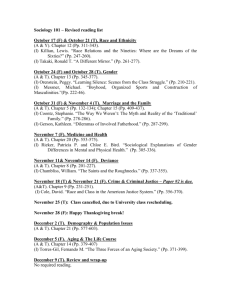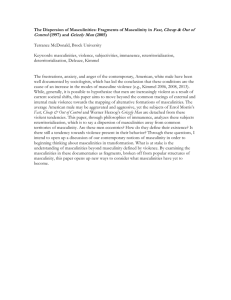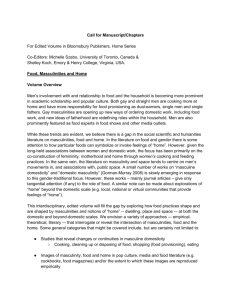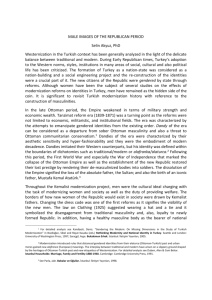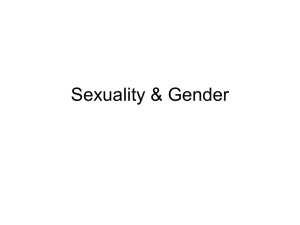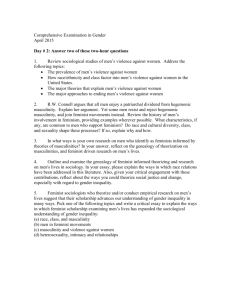Syllabus
advertisement
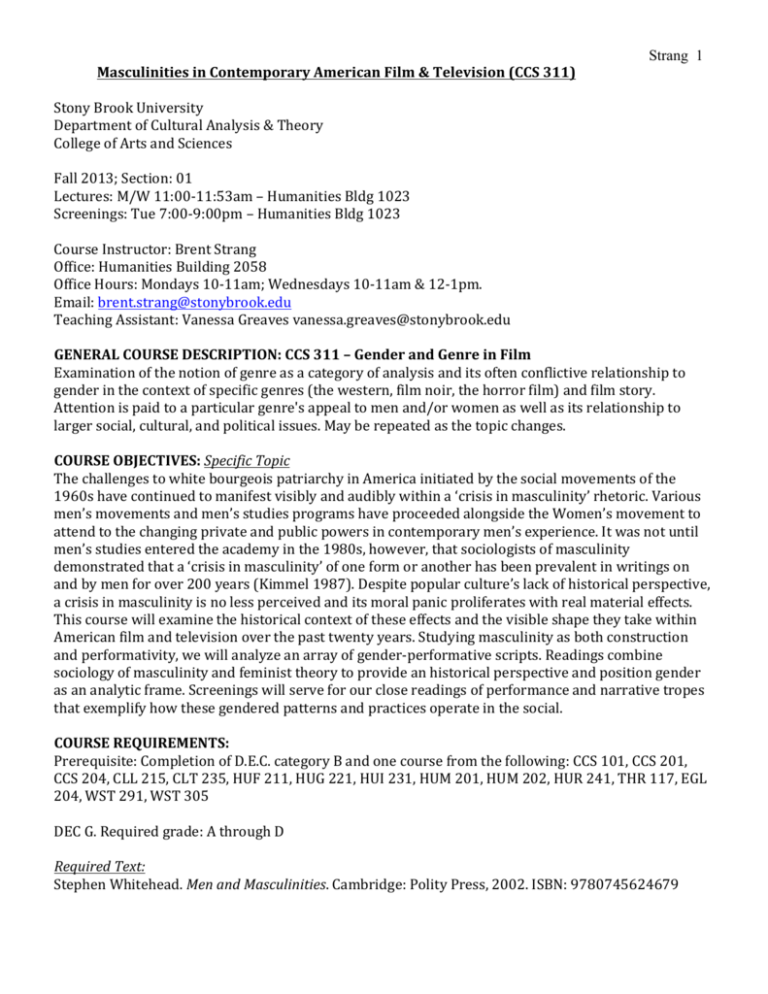
Masculinities in Contemporary American Film & Television (CCS 311) Strang 1 Stony Brook University Department of Cultural Analysis & Theory College of Arts and Sciences Fall 2013; Section: 01 Lectures: M/W 11:00-­‐11:53am – Humanities Bldg 1023 Screenings: Tue 7:00-­‐9:00pm – Humanities Bldg 1023 Course Instructor: Brent Strang Office: Humanities Building 2058 Office Hours: Mondays 10-­‐11am; Wednesdays 10-­‐11am & 12-­‐1pm. Email: brent.strang@stonybrook.edu Teaching Assistant: Vanessa Greaves vanessa.greaves@stonybrook.edu GENERAL COURSE DESCRIPTION: CCS 311 – Gender and Genre in Film Examination of the notion of genre as a category of analysis and its often conflictive relationship to gender in the context of specific genres (the western, film noir, the horror film) and film story. Attention is paid to a particular genre's appeal to men and/or women as well as its relationship to larger social, cultural, and political issues. May be repeated as the topic changes. COURSE OBJECTIVES: Specific Topic The challenges to white bourgeois patriarchy in America initiated by the social movements of the 1960s have continued to manifest visibly and audibly within a ‘crisis in masculinity’ rhetoric. Various men’s movements and men’s studies programs have proceeded alongside the Women’s movement to attend to the changing private and public powers in contemporary men’s experience. It was not until men’s studies entered the academy in the 1980s, however, that sociologists of masculinity demonstrated that a ‘crisis in masculinity’ of one form or another has been prevalent in writings on and by men for over 200 years (Kimmel 1987). Despite popular culture’s lack of historical perspective, a crisis in masculinity is no less perceived and its moral panic proliferates with real material effects. This course will examine the historical context of these effects and the visible shape they take within American film and television over the past twenty years. Studying masculinity as both construction and performativity, we will analyze an array of gender-­‐performative scripts. Readings combine sociology of masculinity and feminist theory to provide an historical perspective and position gender as an analytic frame. Screenings will serve for our close readings of performance and narrative tropes that exemplify how these gendered patterns and practices operate in the social. COURSE REQUIREMENTS: Prerequisite: Completion of D.E.C. category B and one course from the following: CCS 101, CCS 201, CCS 204, CLL 215, CLT 235, HUF 211, HUG 221, HUI 231, HUM 201, HUM 202, HUR 241, THR 117, EGL 204, WST 291, WST 305 DEC G. Required grade: A through D Required Text: Stephen Whitehead. Men and Masculinities. Cambridge: Polity Press, 2002. ISBN: 9780745624679 Strang 2 On Blackboard: Jeffrey Jensen Arnett. “A Longer Road to Adulthood” Emerging Adulthood. NY: Oxford University Press, 2000. Christine Beasley. “Rethinking Hegemonic Masculinity in a Globalizing World” Men and Masculinities 11.1 (2008) 86-­‐103. Judith Butler. “Imitation and Gender Insubordination.” 1993. The Second Wave: A Reader in Feminist Theory. Ed. Linda Nicholson. NY: Routledge, 1997. Robert W. Connell. “Masculinities and Globalization.” Men and Masculinities 1.1 (1998) 3-­‐23. Lee Edelman. No Future. Chapter 1: “The Future is Kid Stuff.” Duke University Press, 2004. Michael Kimmel. The History of Men: Essays in the History of American and British Masculinities. “Introduction: Invisible Masculinity,” “The Cult of Masculinity: American Social Character and the Legacy of the Cowboy.” Albany: SUNY Press, 2005. -­‐-­‐-­‐. Guyland. “Welcome to Guyland,” “What’s the Rush?” New York: Harper Collins, 2008. James Messerschmidt, “Men, Masculinities, and Crime.” Handbook of Studies on Men & Masculinities. Eds. Michael Kimmel, Jeff Hearn, R.W. Connell. London: Sage Publications, 2005. David Morgan. “Learning to be a Man: Dilemmas and Contradictions of Masculine Experience.” Feminism & Pedagogies of Everyday Life. Albany: SUNY Press, 1996. Eve Kosofsky Sedgwick. Between Men: English Literature and Male Homosocial Desire. New York: Columbia University Press, 1985. -­‐-­‐-­‐. Epistemology of the Closet. Chapter 1: “Axiomatic.” University of California Press, 1990. Richard Slotkin. Gunfighter Nation. “Introduction: The Significance of the Frontier Myth on American History.” New York: Atheneum, 1992. Thumim, Janet. “‘Maybe He’s Tough but He Sure Ain’t No Carpenter:’ Masculinity and In/competence in Unforgiven.” 1993. The Western Reader. Ed. Jim Kitses. New York: Limelight, 1998. Robyn Wiegman. American Anatomies “Introduction: Taking Refuge,” “Bonds of (In)Difference.” Duke University, 1995. GRADING: Quizzes (4 @ 10%) 40% Thesis statement & Outline (2 pages) 10% Final Essay (1500-­‐2000 words; 6-­‐8 pages) 40% Attendance/Participation/Course Evaluations 10% All Essays submitted in MLA format (1” margins, 12pt font, an original title, and Works Cited –not incl. in page count). Attendance and Make Up Policy Attendance in lectures and screenings is mandatory and noted. Absences and late assignments will adversely affect your grade and are not excused unless a medical note is provided. Late assignments are penalized one letter grade per day. FILMS & TELEVISION: Glengarry Glen Ross (James Foley, 1992) Mad Men (2 Episodes) (Matthew Weiner, 2007-­‐-­‐) Unforgiven (Clint Eastwood, 1992). The Hurt Locker (Katherine Bigelow, 2008) Strang 3 No Country for Old Men (Coen bros., 2007) Fight Club (David Fincher, 1999) Training Day (Antoine Fuqua, 2001) The Wire (David Simon, 2002-­‐8) Breaking Bad (Vince Gilligan, 2008-­‐2013) Brokeback Mountain (Ang Lee, 2005) Happiness (Todd Solondz, 1998) Step Brothers (Adam McKay, 2008) Arrested Development -­‐ 1 Episode (Michael Hurwitz, 2003-­‐6) Parks & Recreation -­‐1 Episode (Greg Daniels & Michael Schur, 2009-­‐present) MEETING SCHEDULE: Week 1: Aug. 26: Introduction Transnational Business Masculinities Aug. 27: Screening: Glengarry Glenross (James Foley, 1992) Aug. 28: Stephen Whitehead. Men and Masculinities. Introduction & Chapter 1: “Masculinity – Illusion or Reality?” 2002. Week 2: Sep 2: Labor Day = NO CLASSES, but please read: Whitehead, Men & Masculinities. Chapter 2: “The Personal and the Political – Men and Feminism.” 2002. Sep. 3: Labor Day = NO SCREENING Sep. 4: Whitehead, Men & Masculinities. Chapter 4: “Public Men.” 2002. Week 3: Sep. 9: R. W. Connell. “Masculinities and Globalization.” 1998. Sep. 10: Screening: Mad Men (2 Episodes) (Matthew Weiner, 2007-­‐-­‐) Sep. 11: Whitehead Chapter 7: “Desires of the Masculine Subject.” 2002. Frontier Masculinities Week 4: Sep. 16: Michael Kimmel. The History of Men. “Introduction: Invisible Masculinity.” 2005. pp. 3-­‐18. Richard Slotkin, Gunfighter Nation. “Introduction: The Frontier Myth…” 1992. pp. 1-­‐16. Sep. 17: Screening: Unforgiven (Clint Eastwood, 1992). Sep. 18: Janet Thumim. “‘Maybe He’s Tough but He Sure Ain’t No Carpenter:’ Masculinity and In/competence in Unforgiven.” 1993. Week 5: Sep. 23: Quiz #1 // Scene Study & Writing Workshop Sep. 24: Screening: The Hurt Locker (Katheryn Bigelow, 2008) Sep. 25: Michael Kimmel. “The Cult of Masculinity: American Social Character and the Legacy of the Cowboy.” 2005. pp 91-­‐104. Week 6: Sep. 30: Eve Kosofsky Sedgwick. Between Men. 1985. pp 1-­‐27. Oct. 1: Screening: No Country for Old Men (Coen bros., 2007) Oct. 2: James Messerschmidt. “Men, Masculinities, and Crime.” 2005. Homosocial & ‘Antisocial’ Masculinities Strang 4 Week 7: Oct. 7: James Messerschmidt. “Men, Masculinities, and Crime.” 2005. Oct. 8: Screening: Fight Club (David Fincher, 1999) Oct. 9: Eve Kosofsky Sedgwick. Between Men. 1985. pp 1-­‐27. Week 8: Oct. 14: Whitehead, Men & Masculinities. Chapter 3: Power and Resistance.” 2002. Oct. 15: Screening: Training Day (Antoine Fuqua, 2001) Oct. 16: Whitehead, Men & Masculinities. Chapter 3: Power and Resistance.” 2002. Week 9: Oct. 21: Quiz #2// Scene Study & Writing Workshop Oct. 22: Screening: The Wire (David Simon, 2002-­‐8) Oct. 23: Robyn Wiegman. American Anatomies. “Introduction: Taking Refuge” 1995. pp. 1-­‐20. Week 10: Oct. 28: Whitehead. Men & Masculinities. Chapter 6: “Materializing Masculinities.” 2002. Oct. 29: Screening: Breaking Bad (Vince Gilligan, 2008-­‐2013) Oct. 30: Judith Butler. “Imitation and Gender Insubordination.” 1993. Queer Masculinities Week 11: Nov. 4: Quiz # 3 // Scene Study & Writing Workshop Nov. 5: Screening: Brokeback Mountain (Ang Lee, 2005) Nov. 6: Eve Kosofsky Sedgwick. Epistemology of the Closet. Chapter 1: “Axiomatic.” 1990. pp. 1-­‐30. Week 12: Nov. 11: Sedgwick, Epistemology of the Closet. Chapter 1: “Axiomatic.” 1990. pp. 31-­‐63. Nov. 12: Screening: Happiness (Todd Solondz, 1998) Nov. 13: Lee Edelman. No Future. Chapter 1: “The Future is Kid Stuff.” 2004. Arrested Masculinities Week 13: Nov. 18: Thesis statement & Outline Due. Michael Kimmel. Guyland. “Welcome to Guyland.” 2008. Nov. 19: Screening: Step Brothers (Adam McKay, 2008) Nov. 20: Quiz #4 // Scene Study & Writing Workshop Week 14: Nov. 25: Jeffrey Jensen Arnett. “Emerging Adulthood.” 2000. Nov. 26: Screening: Arrested Development -­‐1 Episode (Michael Hurwitz, 2003-­‐6) + Parks & Recreation -­‐1 Episode (Greg Daniels & Michael Schur, 2009-­‐present) Nov. 27: Kimmel, Guyland. “What’s the Rush?” 2008. Week 15: Dec. 2: Christine Beasley. “Rethinking Hegemonic Masculinity in a Globalizing World.” 2008. Dec. 3: Screening: TBA Dec. 4: Final Class = Wrap up. Final Papers Due Strang 5 Americans with Disabilities Act If you have a physical, psychological, medical or learning disability that may affect your course work, please contact Disability Support Services, ECC (Educational Communications Center) Building, Room 128, (631) 632-­‐6748. The staff will work with you to determine what accommodations are necessary and appropriate. All information and documentation is confidential. Students requiring emergency evacuation are encouraged to discuss their needs with their professors and Disability Support Services. For procedures and information, go to the following web site: http://www.ehs.sunysb.edu/fire/disabilities/asp Academic Integrity Each student must pursue his or her academic goals honestly and be personally accountable for all submitted work. Representing another person's work as your own is always wrong. Any suspected instance of academic dishonesty will be reported to the Academic Judiciary. For more comprehensive information on academic integrity, including categories of academic dishonesty, please refer to the academic judiciary website at http://www.stonybrook.edu/uaa/academicjudiciary/ SUNY Critical Management Initiative Stony Brook University expects students to maintain standards of personal integrity that are in harmony with the educational goals of the institution; to observe national, state, and local laws and University regulations; and to respect the rights, privileges, and property of other people. Faculty are required to report to the Office of Judicial Affairs any disruptive behavior that interrupts their ability to teach, compromises the safety of the learning environment, and/or inhibits students’ ability to learn. No-­‐Cell-­‐phone Rule Students should have their cell-­‐phone on vibrate during lecture. Emergency calls should be attended outside the lecture room. Text-­‐messaging is strictly prohibited. Faculty reserves the right to ask students to leave the lecture room if they were found using their cell-­‐phones during lecture. Information regarding Course Web Page You can access class information on-­‐line at http://blackboard.sunysb.edu If you have never used Stony Brook's Blackboard system, your initial password is your SOLAR ID number and your username is the same as your Stony Brook username. For help or more information see https://tlt.stonybrook.edu/StudentServices/BbStudents/Pages/default.aspx For problems logging in, go to the help desk in the Main Library SINC Site or the Union SINC Site
